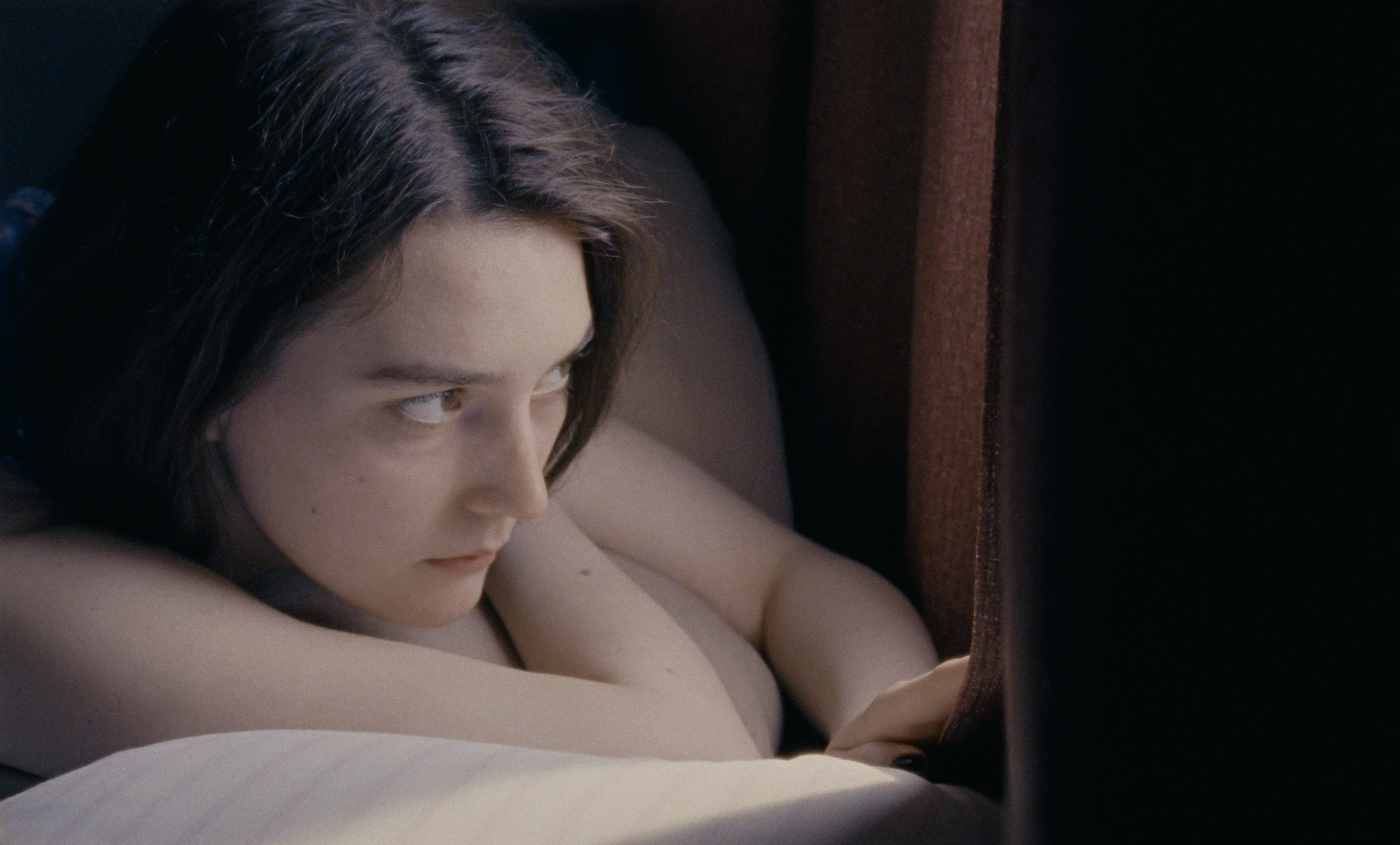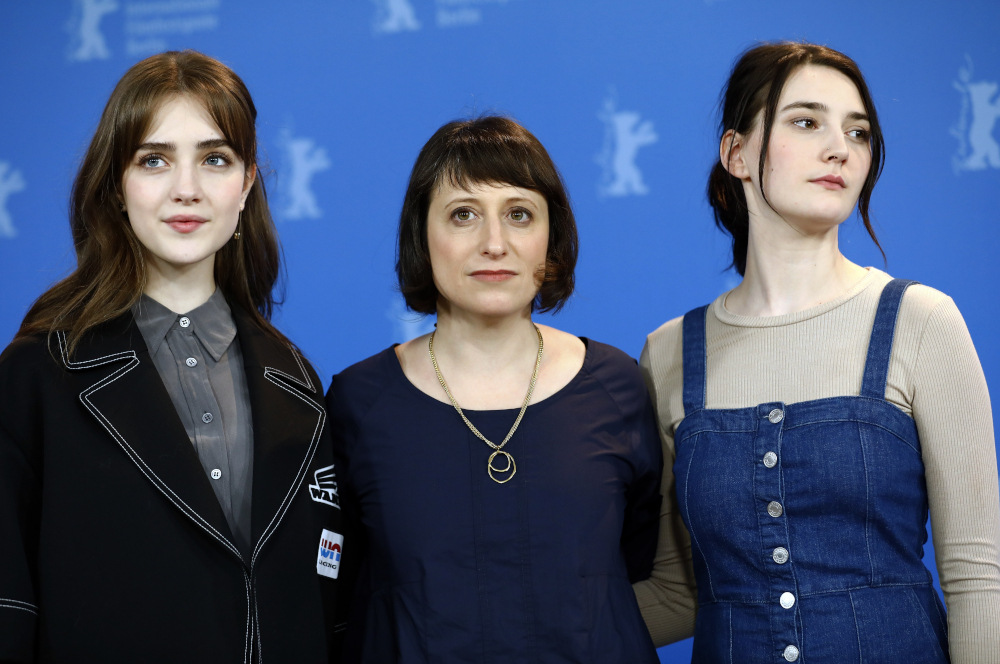Interview: Eliza Hittman on 'Never Rarely Sometimes Always'
 Friday, March 13, 2020 at 1:00PM
Friday, March 13, 2020 at 1:00PM 
The first great movie of 2020 has arrived. Visceral, exquisite and artfully rigorous Eliza Hittman’s Never Rarely Sometimes Always drops the audience into the experience of two teenage girls in rural Pennsylvania. Faced with an unintended pregnancy and a lack of local support, Autumn (Sidney Flanigan) and her cousin Skylar (Talia Ryder) embark across state lines to New York City on a fraught journey trying to secure an abortion. The performances from newcomers Flanignan and Ryder are stunning in their simplicity and authenticity and Hittman reaches new heights with her assured filmmaking no matter what you thought of her previous films, Beach Rats (2017) and It Felt Like Love (2013). The movie won raves at this year's Sundance and won the Grand Jury Prize, or 2nd place, at the Berlinale last month.
 Ryder, Hittman and Flanigan at the Berlinale
Ryder, Hittman and Flanigan at the Berlinale
We recently met with Hittman in New York. [This interview has been edited and condensed for clarity.]
Murtada Elfadl: Congratulations on the film. I saw it at Sundance. I really loved it. It's great.I wanted to ask you first about working with the actors. I hear Sidney Flanagan has never acted before and Talia Ryder has maybe done a couple of things,
Eliza Hittman: Stage. She's done musical theater.
They are amazing. I was flabbergasted by these performances. I read about your casting process, but can you talk about working with them on set, how did you manage to get these performances out of them?
We had a day and a half to prepare and to rehearse. It was a little bit of a nightmare for me because Sidney had never acted before and there wasn't a window of time to make her feel comfortable. She didn't get to meet all the actors who are going to be in the film. There just wasn't this gradual process of warming her up. The first day that she really acted was the first day of our shoot. So it was a challenging day for her.
To prepare in the time that we had, the thing that I tried to focus on the most was relationship building, and not as characters but as young women. They came over to my apartment and I gave them each a marble notebook and a pen and they opened up the notebooks and I had written prompts that were very personal. They both have kind of complicated relationships with their fathers. And the first question in the notebook was the last time I saw my father, my most cherished family vacation. Other things were lighter and then I left and I let them write free as a stream of consciousness and I let them share privately. And I really believe that the bond that's on screen is the bond between Sidney and Talia and not as characters, but as young women.
It shows. I loved this beautiful friendship between them and their support of each other. And that must come from that bond you mentioned.
I think my job as a director is to have intuition about casting. Casting is simple. It's very much about what version of the movie do you want to watch. And you see a lot of people and you're like, do I like this version? I want to see this version. And to know who's going to bring the most depth to the performance on screen. My instincts about Sidney were there from the beginning.
She's great.
Thank you. And Talia too.

All the men in the movie are assholes. There is no other way of putting it.
Sorry.
They're also threatening. That was a deliberate choice I presume, can you talk about it?
Yeah. I think when, the story is sort of a traditional hero's journey in a way. In that structure, there's usually an antagonist. I didn't want to have a character that they come up against who's an obstacle in their way of getting what they want. Because the story is about all these invisible obstacles, I was wondering if I could create an environment that was antagonistic towards them in lieu of having a conventional antagonist. I really wanted to explore the world of ambient aggression towards women, to put the audience in the shoes of what it's like to come of age and to learn how to deflect and defend yourself all the time from men who are making advances in various forms towards you.
It worked. I just read your interview in New York magazine and one of the things you said, and I'm paraphrasing here, excuse me if I don't get it absolutely right. You said something about how turning the camera on is voyeuristic and that struck me because I really felt inside Autumn's experience.
I don't remember the context.
It was in context of the male frontal nudity in Beach Rats.
I think that there's a lot of subjectivity to the films that I make. With Beach Rats it was very much about his body and turning the gaze on the male body when it's traditionally on a woman's body. With this, it's about a character who's hiding herself, and her clothes and her life, hiding her body. I think that my goal is always to try and immerse the audience in what the character is thinking and feeling. It's not just optical, it's not just about point of view shots. It's about really letting the audience walk in the character's shoes.
Obviously the scene in the movie is with the counselor at the abortion clinic. You get the movie's title from it. We are completely in Autumn's experience. Can you talk about your choices there? Most of it is just on her face. The film in general has minimal dialogue.
It's very minimal dialogue. And what dialogue is there is stylistic in a way. It's not written to sound like teenagers. It's just about the essential things that I feel the characters would say to progress the story. It's not about conversational naturalism.
Did you want to elicit a certain effect?
No, that's just the way I write. It's just the way that I began writing. It's the way that I approach it. In terms of that scene, I spent a lot of time on that scene, workshopping it with a counselor from a clinic in Queens called Choices. I eventually ended up casting her because I had spent so much time working with her that it became impossible to imagine anyone else doing it. She's so empathetic and it created part of the space that we worked in. Sidney was a first time actor doing this extremely vulnerable probing scene with a real social worker. I don't think it would have been the same with an actor. From the beginning of the shoot I knew I wanted to shoot it with two cameras. We had two camera bodies throughout the entire production. I always knew it was going to be sort of frontal, like an interrogation. The only take that ended up being in the scene is the frontal camera , the first take. So Sidney nailed it on the first take.
 With this film you've already had a lot of success in Sundance, at Berlin. Do you feel that this is different from your other films?
With this film you've already had a lot of success in Sundance, at Berlin. Do you feel that this is different from your other films?
Yes. I mean they're each different. Beach Rats was more controversial for people. It Felt Like Love was a micro budget movie that I made for well under $100,000. So that movie was just a miracle. They each have their own pathway. I think that the other films spoke to audiences on an international level maybe because of their craft. And I think this film speaks to audiences on an international level because of what it's fundamentally about.
It's visceral. You feel it. Minimal dialogue, that's just one part of your style. I've seen your three movies. There is a style to what you're doing. I don't want to give it a name, but it's like cinema verite. Realistic, not a lot of dialogue, no music at all.
I think it builds off of maybe that world, but it's also more stylistic in some ways. Like I use slow motion, extreme close ups and like I said, the dialogue is not always real. The approach to time maybe is also not real always.
Do you think of it as your style that's going to fit whatever story you want to tell or does it change?
It changes. I think it evolves in the approach, but I think that there's obviously similarities throughout.
My last question to you. In this political climate we're living in and with this hot button issue movie coming out, do you feel a responsibility to tell certain stories or do the stories just come organically?
I actually started developing this film in 2012. I tried to get it made in 2013 and failed. I always thought the movie was timely but the world didn't think it was timely until now.
And for your future work.
That's not part of what drives me as an artist. This movie, I felt that importance and responsibility, but I think creatively, there's always different things that appealed to me about different projects.
Never Rarely Sometimes Always is in select theaters starting today March 13th, 2020.



Reader Comments (6)
This site is dead anymore
This a great interview! I'm praying this opens near me soon.
Keep praying
I really want to see this, and am sad that seeing it in a theater seems unlikely at this point. Hope it finds an audience somehow.
I was reading about this recently and am interested in seeing it. For some of these smaller films, like this one ... I wonder if concerns about the Coronavirus will lead to an accelerated move to DVD and streaming services, since it seems virtually impossible that these films will find an audience in the theaters.
Also, I was reading that Sharon Van Etten is in this! She's an exceptional recording artist and acts occasionally (I haven't seen her act in anything, but I love her music). I'm curious how she is.
JJM - Van Etten plays Autumn's mom, it's a tiny part as the film follows the two leads journey from PA to NYC.